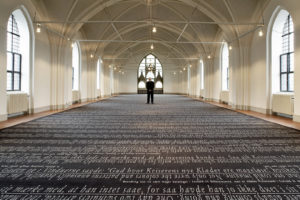“One thing my dad always used to say was that it was only fair for him, or any pastor for that matter, to receive the same sort of compensation as any other teacher in that local market. Besides… being poor doesn’t make you any holier.”
For whatever reason, about 4 years ago, this statement was pressed by the mother of one of my best friends as a conversation emerged around the subject of money came up, and specifically stewardship of it- what was fair compensation for a church body to supply for their pastor. What does it mean to not “muzzle the ox while he is threshing,” and “the laborer is worthy of his wages” (1 Tim5:18)?
I remember hearing “being poor doesn’t make you any holier,” and immediately debating whether I agreed with her. What about the more typically ascetic and minimalist lifestyle that John the Baptist and Jesus seemed to embody, and the rather unwealthy description of the traveling lifestyle Jesus commands his disciples to embody as he sends them out to share the gospel of the Kingdom (Mark 6:7-13).But then again, I had to consider the fact that throughout church history, there has been a tendency to idolize asceticism, made popular by the monastic movement, a movement with some benefits- but which also introduced and circulated some weaknesses around understanding sanctification (i.e. in maintaining a sacred-secular divide, mudding the waters of the priesthood of all believers, and in some orders, and limiting opportunity for the proactive sharing of the gospel due to the hermit like practices of cenobitic traditions).
Furthermore, we see especially in the OT that wealth is generally regarded as good- it is a sign of blessing from God, especially as a result of one’s life of faithfulness in work and service (Proverbs 10:22, 28:20). In fact, without some being stewards of wealth, the more opportunity there is to worship God through generosity and stewardship of that money. And, one must not forget the distinction that we hear taught in so many sermons- that money is not the root of all sorts of evil, but the love of it (1 Tim 6:10).
So, money is not in and of itself evil. But, this does not quite answer the question “does being poor actually make you holier?”
It seems that she is right: poverty doesn’t make us any holier. But, it might leave us happier, or perhaps even more counter-cultural, more fortunate or well off.
“Blessed are you who are poor, for yours is the kingdom of God “(Luke 6:10) and Matthew’s “Blessed are the poor in spirit, for theirs is the Kingdom of heaven” (Matt 5:3) reveals that there is an intrinsic connection between poverty and experience and participation in the Kingdom of God. It is important to note that “blessed” here does not really denote that the poor are those whom God blesses as compared to those he doesn’t (eulogew vs. makarioj). Rather, it means that the one who is poor is fortunate, worthy of congratulations. This is built upon OT precedent that equates poverty with piety, where the “poor” or the “meek” are those who humbly trust God in the midst of afflictions, those persecuted by the world, but who will be ultimately vindicated by God.[1] Thus, the mark of a disciple is one who lives in an attitude of poverty and dependence on God. Although it is possible to live as such while still attaining wealth, it is not oddity that many in both the Gentile world (1Cor 1:26-29) and Christians from first century Palestine who took up the cross to follow Jesus were those from the lowest social rungs. Even today, the Gospel spreads deeper, quicker, and wider amongst those whose economic privations leave their spirit with nowhere to look and to rely on than God himself.
Wealth then is not wicked. But it is absolutely a barrier. Just as wealth becomes an immense stumbling block for the otherwise capable and disciple-hearted rich young ruler, wealth is the barrier that keeps him from being counted a citizen of the Kingdom of God. And for many of us, despite headlines of economic depression and uncertainly, and truly rich beyond comparative measure to so many. And as a result, a poor and contrite spirit, an essential mark of a disciple, is something that we in the West lack so needful each and every day.





Leave a Reply
Your email is safe with us.